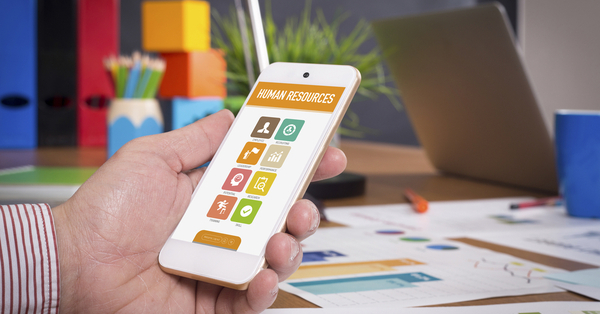
The pivotal role of a human resources team cannot be overstated within any enterprise, as its influence is decisive in the flourishing or failing of the company. Tasked with a multitude of critical responsibilities, HR practitioners manage everything from the intricacies of recruitment, employee relations, performance evaluations, to the complexities of payroll.
What then is the solution? The advent of HR mobile applications marks a revolutionary shift in solving such predicaments. These apps are ingeniously designed to facilitate seamless communication, optimize the hiring process, and enhance the overall workflow within an organization. It’s hardly surprising that a staggering 97% of HR executives are intent on increasing investments in recruiting technology.
The Role of Mobile Apps in HR
Here’s an overview of vital HR tasks that are made more efficient through mobile implementation.
-
Mobile Absence Management: Tracking employee leave like vacations or sick days is critical for HR teams. Traditionally, this is a resource-heavy task, but mobile apps streamline the process. Employees have the convenience of submitting leave requests directly from their phones, facilitating a seamless connection with the workplace, especially during unplanned absences.
-
Efficient Document Management: Whether on the field or away from their workstations, employees occasionally need to access work-related documentation.
-
Simplified Time Tracking: The era of handwritten timesheets is behind us. Modern mobile HR applications include time tracking features, enabling employees to accurately record their hours from any location. This not only applies to office workers but also supports remote and field workers, ensuring an efficient and error-free process.
-
Accessible Employee Records: Mobile applications serve as a dynamic repository for HR data.
Benefits of Utilizing Mobile Apps in HR
1. Reduces Human Errors
When handling the data for a large workforce, be it hundreds or thousands, errors are bound to happen. The sheer volume of data such as leave records, timesheets, and entry logs can be overwhelming, increasing the likelihood of overlooked details in traditional management systems. Yet, the implementation of an HR management app significantly reduces the risk of these human errors and omissions, ensuring critical information is captured accurately and efficiently.
2. Increases Efficiency
Advertisment
The main task facing the HR mobile app is to optimize efforts and reduce the time spent on basic tasks. However, not only this kind of application can give a similar result. HR managers can also download iOS app that records phone calls. By using such app, managers can save important conversations or even record messages without being distracted from their main work. One of the worthy representatives of the class is Call Recorder for iPhone. This call recording app can save recordings in high resolution, allows them to be shared and offers an intuitive interface.
3. Improves Employee Engagement
A mobile HR application offers a supplementary pathway for engaging with your workforce. With the implementation of push notifications, employees can be prompted to finalize pending assignments and stay abreast of the latest organizational news as it happens. By harnessing mobile technology, accessibility to essential resources like a time-tracking feature is significantly enhanced, enabling staff to use these tools seamlessly from any location.
4. Improves Communication
With an HR application, a company can create a comprehensive mobile directory for its employees, ensuring access is not limited by location or time. This directory includes essential details such as employee contact information, paving the path for immediate and effortless communication among peers.
5. Employee and Leave Management
Many small to medium-sized businesses struggle with managing payroll, leave, attendance, and other personnel records, primarily due to the absence of a specialized HR department. Custom employee management solutions developed by mobile app companies can be a game-changer for these organizations. These apps provide clear communication channels between management and staff, and cover various aspects of human resources management.
6. Attracts Younger Generations of Employees
The moniker ‘digital natives’ genuinely fits millennials and Generation Z, as they were raised in an era steeped in technology, with computers and mobile devices as their playthings. Archaic, sluggish methods of communication and antiquated paper-based administrative duties stand a high chance of dissuading the burgeoning workforce. Showcasing a workplace that’s not just enabled but optimized for mobile can be pivotal in harnessing the full potential of new and prospective staff members, while also potentially boosting job satisfaction.
7. Promotes the Formation of a Learning Organization
Training and development stand out as pivotal elements within HR responsibilities. Through the utilization of sophisticated HR mobile apps, companies can seamlessly incorporate in-house training modules and learning management systems (LMS) for the professional growth of their employees.
8. Prompt Feedback
The absence of communication between staff members and human resources frequently results in employee discontent and a drop in their engagement with the company. This is where mobile feedback solutions can have a remarkable impact, offering a platform for immediate two-way feedback.
Conclusion
Ensuring a seamless onboarding process for new employees is a vital role of the HR department. A mobile app can serve as an effective management tool for this purpose. It facilitates a smooth introduction to the company, assisting newcomers in acclimating to the organizational culture and workflow.










